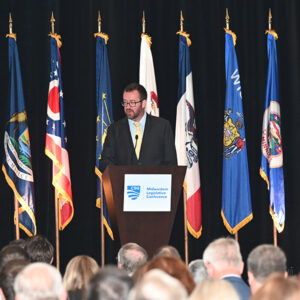Reid Wilson: Policy breakthroughs are continuing in states amid a deep national partisan divide
Between 2015 and 2021, the amount of spending by lobbyists in state capitals jumped from $1.75 billion to $2.21 billion. And it’s little wonder, Reid Wilson said during a keynote session in July that kicked off the Midwestern Legislative Conference Annual Meeting: A lot is getting done and tried in those capitals.
He pointed to several new policy innovations and trends, often being pursued with bipartisan support.
 They range from new investments in mental health (988 lifelines and more counselors in schools) and infrastructure (rebates for electric vehicles, road and bridge repairs, and broadband grants), to the pursuit of new laws that shore up election systems and address concerns about the impacts of social media and artificial intelligence.
They range from new investments in mental health (988 lifelines and more counselors in schools) and infrastructure (rebates for electric vehicles, road and bridge repairs, and broadband grants), to the pursuit of new laws that shore up election systems and address concerns about the impacts of social media and artificial intelligence.
“What happens in Des Moines or Madison today will happen in 25 other states next year, and then become federal policy in a few years,” said Wilson, who is one of the nation’s most respected political journalists as well as the founder and editor of Pluribus News, which covers state-level policy across the country.
The job of elected officials is more complicated than ever before, Wilson said, because of the general mood of the country and a deep partisan divide. “The American malaise right now is very bad, and it’s been happening for a long time. Americans are not in the mind to give the president the benefit of the doubt, no matter which party he’s from,” he said. “This speaks to something really deep and fundamental right now.”
In 1999, he said, Democratic and Republican voters agreed on four of the five “top” issues facing the country. In 2023, they agree on none. “We’re just about two countries living side by side,” Wilson added. Despite these challenges, a Pluribus survey of state legislators conducted earlier this year showed most of them were satisfied with their jobs; many, too, felt the 2023 session in their states was more productive than the year prior. At the same time, many legislators report that partisan division is on the rise in their respective state capitals.
“I hope you fight against this in your states, but I have the increasing sense that which infects D.C. is creeping into the states,” Wilson said. Responding to audience questions, Wilson said some of the causes of this creep include the state of constant campaigning, as well as in both the rise of partisan “infotainment” news channels and in declining news coverage of state legislatures.